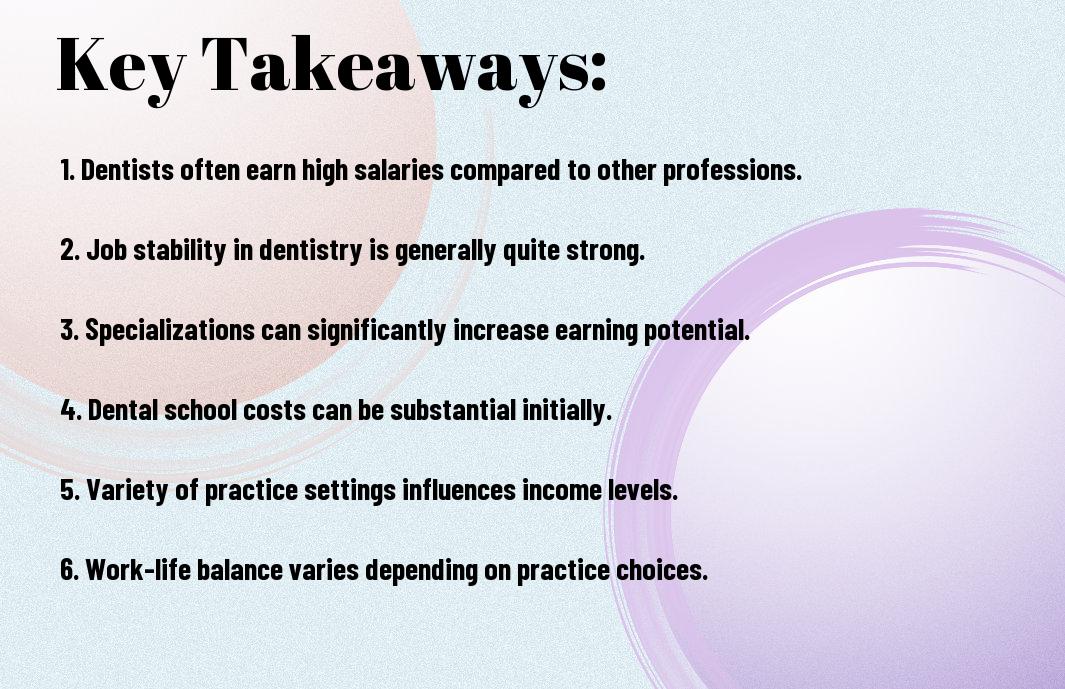You may be considering a career in dentistry and wondering if it offers a solid financial return. The dental profession not only provides the opportunity to help others maintain their oral health, but it can also lead to a lucrative income. In this post, we will explore into the financial aspects of being a dentist, including average salaries, potential expenses, and factors that influence earnings, helping you assess whether this career aligns with your financial aspirations.
Key Takeaways:
- High Earning Potential: Dentists often enjoy a lucrative salary, with many earning six-figure incomes.
- Job Stability: The demand for dental services remains strong, providing a stable career path for practitioners.
- Variety of Specializations: Dentistry offers various specialties, allowing professionals to pursue areas that align with their interests.
- Work-Life Balance: Many dentists have the flexibility to create a schedule that accommodates personal life, especially in private practice.
- Education and Training Requirements: Becoming a dentist involves significant investment in education and ongoing training, which may influence initial earning potential.

Understanding Dentist Earnings
Before plunging into the world of dentistry, it’s important to have a clear understanding of the potential earnings you can achieve as a dentist. The dental profession encompasses a variety of specializations, each contributing differently to your overall income. There are factors that can influence your earnings, so knowing these can help you make informed career decisions.
Average Salaries by Specialization
Salaries vary significantly depending on your area of specialization within dentistry. General dentists typically earn between $150,000 and $180,000 annually, while specialists like oral surgeons or orthodontists can make upwards of $300,000 or more per year. Understanding these figures is critical as you pursue your career.
Factors Influencing Income
After knowing the average salaries, it’s important to recognize the various factors that influence your income as a dentist:
- Geographic location
- Type of practice (private, group, or corporate)
- Years of experience
- Specialization
- Patient volume and practice management
Recognizing these elements can guide your decisions and help maximize your potential earnings.
Earnings in dentistry can be affected by additional considerations that impact your financial trajectory. These include your ability to attract and retain patients, the economic climate of your chosen area, and how well you manage costs within your practice.
- Marketing and outreach strategies
- Efficient practice operations
- Continued education and skill enhancement
- Networking within the dental community
- Insurance affiliations and agreements
Recognizing these factors will further help you understand how to enhance your financial prospects in this rewarding profession.
Cost of Dental Education
Some aspiring dentists often underestimate the substantial cost associated with dental education. Tuition for dental school can vary significantly depending on the institution, program length, and location, leading to hefty student loan debt for future practitioners. Understanding this financial commitment is vital for anyone considering a career in dentistry.
Tuition and Fees
Among the many expenses you will face, tuition and fees can range from $20,000 to over $70,000 per year, depending on whether you attend a public or private dental school. Additionally, costs for materials, instruments, and living expenses will further increase your financial investment during your education.
Return on Investment
For those contemplating the financial implications of becoming a dentist, the return on investment (ROI) can be quite rewarding. While the initial costs may seem daunting, the earning potential as a licensed dentist often justifies the expense, leading to a favorable outlook over time.
Dental professionals can earn a substantial income, often exceeding six figures annually, making it possible to pay off student loans and achieve financial stability relatively quickly. The demand for dental services ensures that you can build a successful practice or join an established one, often leading to job security and professional growth. Therefore, when evaluating your future in dentistry, it’s imperative to weigh your initial educational costs against the potential lifetime earnings in the field.
Work-Life Balance in Dentistry
Once again, achieving a healthy work-life balance in dentistry is vital for your overall well-being. The profession can be demanding, but many dentists find joy in their work while maintaining personal lives. By setting boundaries and managing your schedule effectively, you can enjoy both professional fulfillment and personal satisfaction, ensuring that neither aspect of your life outweighs the other.
Work Hours and Scheduling
By being a dentist, you often have the flexibility to set your own work hours, which can lead to a better work-life balance. Many dental practices offer varying schedules, from traditional 9-5 hours to part-time options. This flexibility allows you to prioritize personal commitments, making it easier to find a rhythm that suits your lifestyle.
Stress and Job Satisfaction
Along with the potential for job satisfaction, the dental field can also bring stress due to the high stakes involved in patient care and practice management. However, finding ways to manage stress is vital. By prioritizing self-care, seeking support, and engaging in professional development, you can enhance your satisfaction while mitigating pressure.
Also, investing time in hobbies, family, and relaxation can significantly reduce stress levels. Techniques such as mindfulness or exercising can contribute to improved mental health, enabling you to handle the demands of your job more effectively. When you take care of your personal well-being, you’ll likely find that your professional performance and job satisfaction follow suit, ultimately leading to a more harmonious and rewarding career in dentistry.
Geographic Variability in Income
Not all dentists earn the same income, as factors like location significantly influence their salaries. How much do dentists actually make? And come on is it … Understanding these geographic disparities is imperative for prospective dental students and practitioners looking to choose a suitable practice location.
Urban vs. Rural Earnings
Geographic factors play a key role in the earnings of dentists. Generally, urban areas offer higher salaries due to increased demand and higher living costs, while rural regions may present lower incomes. However, rural dentists often enjoy reduced competition and a loyal patient base, which can balance out potential earnings.
State-by-State Analysis
Beside geographic differences, income can vary significantly on a state-by-state basis. States like California and Texas tend to offer higher salaries compared to smaller or less populated states, providing varied opportunities based on your location.
Income figures reflect not only regional demand but also state-specific living costs and economic conditions, which can shape your potential earnings in the dental field. You might find that certain states offer significant bonuses, incentives, or benefits, highlighting the importance of researching your options thoroughly if you’re considering where to establish your practice.
Career Advancement Opportunities
Unlike many professions, dentistry offers a wealth of career advancement opportunities. You can move beyond general practice into various specializations, which can significantly enhance your income and professional satisfaction. Additionally, engaging in continuing education can open doors to leadership roles, research positions, or teaching opportunities at dental schools, allowing you to diversify your career while potentially earning a higher salary.
Specializations and Their Payoffs
One of the most appealing aspects of a dental career is the ability to specialize in areas such as orthodontics, oral surgery, or pediatric dentistry. These specializations often come with higher earning potential and the ability to provide complex care, enabling you to have a more significant impact on your patients’ lives while also paving the way for a more lucrative career.
Ownership vs. Employment
To understand the financial landscape of dentistry, you must consider the choice between ownership and employment. Each route has its benefits, but ownership typically offers greater earning potential and personal satisfaction, allowing you to build equity in your practice. In contrast, employed dentists may enjoy more stability and fewer responsibilities, which can appeal to those seeking a more predictable work-life balance.
It is important to weigh the pros and cons of ownership versus employment carefully. Owning a dental practice allows you to call the shots and enjoy the financial benefits from practice revenues, ultimately leading to higher income opportunities. However, being an owner also comes with increased responsibilities such as managing staff, expenses, and the stress of running a business. As an employee, while your income may be lower, you benefit from a steady paycheck, employee benefits, and reduced managerial duties, which can provide a more stable lifestyle. Consider your professional goals and financial expectations as you decide which path aligns with your aspirations.

Job Market Outlook
To understand the financial potential of a career as a dentist, it’s important to explore the job market outlook. The demand for dental professionals is projected to remain strong as the population grows and the emphasis on oral health increases. Emerging technologies and advanced treatment options will also shape the landscape of dental care, making this a viable and rewarding career path for you in the coming years.
Demand for Dental Professionals
After analyzing current statistics, it’s evident that the demand for dental professionals continues to rise, driven by an increased awareness of oral health and access to dental services. With a growing aging population requiring specialized dental care, your skills will be highly sought after, ensuring a stable job market.
Trends in Dental Practice
Along with the steady demand, trends in dental practice indicate a shift toward minimally invasive techniques and tech-driven services. As more patients seek preventive care and aesthetic dental procedures, your practice can expand to include these key areas, contributing to your financial success.
In addition, the integration of telehealth and digital technologies is transforming how dental care is delivered. You can take advantage of these advancements to enhance patient experience and streamline operations. Keeping abreast of these trends will not only elevate your practice but also help you maintain a competitive edge in the evolving dental landscape.
Final Words
Summing up, pursuing a career in dentistry can indeed provide you with good financial rewards. Dentists frequently enjoy competitive salaries and opportunities for specialization that can increase your earnings even further. If you’re interested in maximizing your earning potential, consider exploring 7 of the Highest-Paid Dental Specialties in 2024. By investing in your education and skills, you can not only enhance your financial stability but also make a meaningful impact in the lives of your patients.
Q: What is the average salary for dentists?
A: The average salary for dentists can vary significantly based on factors such as location, experience, and specialization. As of 2023, the annual salary for a general dentist in the United States is typically between $150,000 and $200,000. Specialists, such as oral surgeons or orthodontists, can earn higher incomes, often exceeding $300,000 per year. It’s also vital to consider that many dentists can increase their earnings through private practice ownership.
Q: Are there additional financial benefits to being a dentist besides salary?
A: Yes, there are several financial benefits associated with a dental career beyond the base salary. Many dentists have the opportunity to run their own practices, allowing them to increase their earnings directly based on the success of their business. Additionally, dentists often have access to benefits such as health insurance, retirement plans, and continuing education reimbursements, which can enhance their overall financial well-being.
Q: What are the factors that influence a dentist’s earning potential?
A: Several factors influence a dentist’s earning potential, including educational background, years of experience, geographic location, and the type of practice they work in (private practice vs. corporate dentistry). Dentists in urban areas may earn more due to higher demand, while those in rural areas might face less competition. Moreover, specialization can lead to higher earnings as certain fields, such as cosmetic dentistry, can command premium fees for services.






